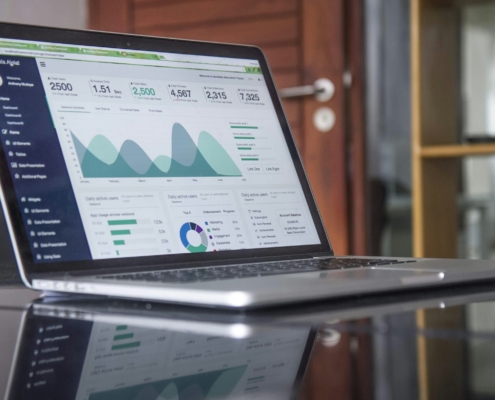13 Reasons Why Your Keyword Rankings are Dropping
Table of Contents
Have you experienced your SEO ranking drop or a decrease in traffic? There are so many reasons why this negative impact could be happening, and it can be exhausting to get to the bottom of the issues if you are not an expert in the field.
This can be especially difficult when you feel like you have done everything correctly and implemented the proper practices. However, if this is the scenario, the solution may be easier than you know. To help you better understand the changes impacting your SEO rankings and traffic, our SEO specialists look at 13 of the most common reasons you may experience these changes.
Change in Google’s Algorithm
One of the common reasons for change is Google’s algorithm, which is the equation used to present websites. For example, in May 2021, Google had some minor algorithm updates. Unfortunately, more than 200 factors influence the algorithm, which can update at any time and can be highly volatile. However, an SEO expert can prepare and adapt to anticipate any future algorithm changes. These strategies involve using sustainable SEO tactics that pair with Google’s mission of providing consumers with useful, good content.
Receiving Manual Action
When you receive a penalty against your website, this is referred to as a manual action. This action is implemented by a human reviewer of your website who considers your webpage uncompliant with Google’s Webmaster Quality Guidelines. When you experience either a manual or automatic action, you can generally tell by comparing your rankings in Google with Yahoo or Bing. You will need to fix the offending actions, which could be anything from unnatural link building, user-generated spam, or sneaky redirects.
Wrong Keywords
It’s getting that delicate balance between what keywords you believe consumers are using and those that they are. This is where updating your SEO strategy is essential to align with your audience’s intent. For example, if you are experiencing a significant loss in organic rankings, it may be time to stop using old, generic, and complicated keywords and start thinking like the consumer.
Spammy Link Building
A backlink is a vote of confidence for our websites; however, if you have acquired some spammy backlinks, you will likely be penalized by Google Penalty. It won’t escape Google, and they will de-rank you instantly from search results, which will significantly negatively impact SEO results and traffic.
Show Pages
People want information fast, and so does Google, which is why page speed is even more critical as time goes on. The time it takes for your page to load will see Google tweaking your ranking and will also provide consumers with a poor experience where they won’t want to return.
Fortunately, your page load speed can be checked through Google’s PageSpeed Insights tool. It will analyze the performance and load speed and are ranked by fast, average, and low.
Links That Are Lost
It can sometimes happen; however, if you lose links on your website, that could be contributing to a drop in your rankings. Using a third-party tool such as Ahrefs to track your backlinks and webpage for lost links over the previous 90 days.
Competitors are Excelling
A drop in SEO ranking may have nothing to do with your website but have more to do with competitors excelling at theirs. The key to getting the most out of organic searching is by staying ahead of the competition. They may have expanded or updated their content or bought quality backlinks which gives their website the edge.
Poor Redirect Strategies
An effective redirect strategy for the successful launch of a new website or migrating to a new server is essential; otherwise, you will likely experience a drop in traffic and rankings. A 301-redirect plan is what notifies Google that you’ve ‘moved.’ A successful redirect strategy will save you from losing traffic and let Google know that you haven’t duplicated content. Read this article to know more redirect plugins for SEO.
The Nature of Search
Natural changes to search can affect the rankings and traffic to a website. For example, Google Search changes to meet the demands of a user, especially when there is an increase or trend in a search topic. This means that newer results or news articles will be on top, and static content will go down. You can monitor this on the Google Trends tool.
Incorrectly Tracking Rankings
When you constantly search your target keywords and then from search clicking on your website, you are engaging in click manipulation. This, therefore, is not displaying accurate search results and is considered an unethical SEO tactic. The best way to move forward is to track unbiased rankings using a third-party tool.
Server Issues
Your server could be contributing to the loss of your organic traffic. For example, a server problem can lead to broken caching, an empty markup, or indexing prevention. Moving forward, you need to monitor for errors and use Google’s Fetch and Render tool to test your website.
The UX Needs Work
It’s what you do with your rankings and traffic that matters because your page will be abandoned if users aren’t satisfied. So optimizing your website for a better user experience can go a long way towards creating a better experience and causing Google to send you down the rankings.
Duplicate Content
Duplicate content can have a severe impact on your website rankings. If you deliberately duplicate information or use very similar content, each page will be inhibited, and rankings will be penalized. The best way to avoid this is to use original content.
Contact Us to Move Forward
These are just some of the issues you may face; however, before moving forward, contact our SEO team and talk to an SEO professional who can help you scale up your SEO success.







